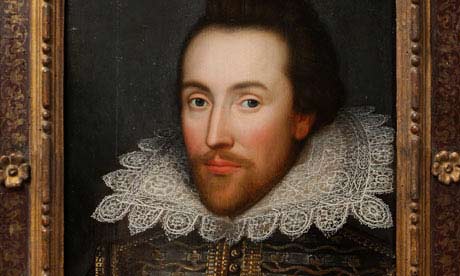|
 An image of Shakespeare. The discounted claims of an 18th- century author to have re-shaped the words of Shakespeare into a play are finally being taken seriously by a respected publisher of the Bard's works nearly 300 years on.
|
|
The discounted claims of an 18th- century author to have re-shaped the words of Shakespeare into a play are finally being taken seriously by a respected publisher of the Bard's works nearly 300 years on. Double Falsehood, a play written by Lewis Theobald and first performed in 1727, was based substantially on another work co-written by William Shakespeare more than a century earlier, a leading academic said on Tuesday. Adding weight to the claim of Professor Brean Hammond of Nottingham University is the fact that the respected Arden Shakespeare publishers will release it in print on March 22. Its appearance, and the attribution to Shakespeare, is likely to trigger another round of scholarly debate over what the English-speaking world's most famous and influential playwright wrote and what was falsely attributed to him. For Hammond, the publication of the play next week will be the culmination of years of research. "I started working on it in the 1980s and wrote a couple of articles on the play," he said. Theobald always claimed his play was based on a lost version by Shakespeare that was in turn based on the story of Cardenio, taken from the novel Don Quixote, by Spanish author Miguel de Cervantes. Hammond said modern scholarship had established that the early work, performed in 1613, was co-written by Shakespeare and John Fletcher. Theobald then substantially re-worked and cut it, meaning the presence of three hands in the present version. "Shakespeare wrote most of the first half (of the original) and Fletcher wrote most of the second half - you could detect a new hand from the style of writing," Hammond said. Theobald's work, a story of love and betrayal, was popular with 18th-century audiences, but the playwright was widely dismissed as a fraudster for claiming he had used the words of Shakespeare. "The play has been rubbished in the past," Hammond said. "It did have a successful theatrical run when it came out, but soon after people began asking questions and thought that it was not a single author play by Shakespeare and we know that it's not." That interpretation became widely accepted and the play has languished in relative obscurity until now, when the work will be widely accessible for the first time in more than 250 years. "What's left in it now for the modern reader is Shakespeare's DNA," Hammond said. (Read by Lee Hannon. Lee Hannon is a multimedia journalist at the China Daily Web site.) (Agencies) |
日前,一部据称为18世纪一名作家根据莎士比亚作品改编而成的戏剧终于在近三百年后被莎士比亚作品权威出版商验明真身。 据一名主要研究人员本周二介绍,这部名为《爱情骗徒》的戏剧由刘易斯•希尔包德改编,并于1727年被首次搬上舞台。经考证,这部戏剧大部分根据一个多世纪以前威廉•莎士比亚与人合著的另一剧作改编而成。 莎士比亚作品权威出版商“亚顿”将于本月22日出版该剧作,这为诺丁汉大学布里恩•哈蒙德教授有关这一问题的说法增加了筹码。 这部剧作的面世及其为莎翁所创的说法将可能激起新一轮有关哪些剧作为这位英语文学界最著名和最具影响力的剧作家真正所创,哪些又确为赝品的学术争论。 对于哈蒙德来说,下周这部作品的出版将使多年来有关这一问题的研究达到顶峰。他说:“我从上世纪80年代开始研究这部剧作,就此写了很多文章。” 希尔包德当时一直声称这部剧作改编自莎翁一部失传的剧作,而莎翁的原创又取材于西班牙文学巨匠米格尔•德•塞万提斯名著《堂吉珂德》中的卡登尼欧的故事。 哈蒙德称,现代研究已证实,这部于1613年首演的作品为莎士比亚与约翰•佛莱契尔合著。之后,希尔包德对其进行了大量的改编和删减,导致目前的版本中出现了三种笔法。 哈蒙德说:“莎士比亚主要撰写了原著的前半部分,佛莱契尔则主要写了后半部分。这可以从文风上看出来。” 希尔包德改编的这部关于爱情和背叛的作品在18世纪时很受观众喜爱,但由于他称其根据莎翁作品改编而成,因此被斥为骗子。 哈蒙德说:“这部剧作一直受到贬损。它最初被搬上舞台时非常成功,但不久之后人们开始提出疑问,认为这不是莎翁独创的作品,现在我们知道它的确不是。” 这种说法逐渐被广泛接受,而这部剧作在250年后的今天才得以重见天日,与广大读者见面。 哈蒙德说:“现代读者还能从中找到莎翁的影子。” 相关阅读 Shakespeare: Master of Tragedy 悲剧大师 Shakespeare's Globe Theatre 莎士比亚环球剧场 Shakespeare the Historian 史学家的莎士比亚 (中国日报网英语点津 Julie 编辑蔡姗姗) |
|
Vocabulary: discount:to leave out of account; disregard(怀疑地对待,漠视) the Bard:莎士比亚的别称,也称为the Bard of Avon,bard一般用来指吟游诗人。 fraudster:one who commits fraud(骗子,犯欺诈罪者) |
